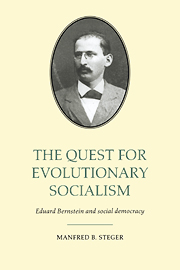Book contents
- Frontmatter
- Contents
- Acknowledgments
- List of abbreviations
- Introduction: the nature of Bernstein's quest
- Part 1 Preparation
- 1 The making of a social democrat
- 2 Persecution and exile
- 3 The “Revisionist Controversy”
- Part 2 Vision
- Part 3 Disappointment
- Epilogue: evolutionary socialism at the “end of socialism”
- Select bibliography
- Index
1 - The making of a social democrat
Published online by Cambridge University Press: 06 October 2009
- Frontmatter
- Contents
- Acknowledgments
- List of abbreviations
- Introduction: the nature of Bernstein's quest
- Part 1 Preparation
- 1 The making of a social democrat
- 2 Persecution and exile
- 3 The “Revisionist Controversy”
- Part 2 Vision
- Part 3 Disappointment
- Epilogue: evolutionary socialism at the “end of socialism”
- Select bibliography
- Index
Summary
Prologue
At first glance, an assessment of Eduard Bernstein's life and thought seems to be a fairly straightforward project. Hannah Arendt has put the matter succinctly: “Bernstein was honest, analyzed what he saw, was loyal to reality and critical of Marx.” Sir Isaiah Berlin concurs: “Eduard Bernstein pointed out more clearly than any one before him the apparent non-fulfillment of various Marxist prophesies.” Yet, two entirely different images of the “Father of Revisionism” emerge from the descriptions of his contemporaries. The first, characterized by the relentless criticism of his political and ideological opponents, presents a weak, theoretically confused man who repaid the kindness of his mentor, Friedrich Engels, by attempting to destroy the “communist world outlook” of “scientific socialism” and betraying the cause of the proletariat. The second account, conjured up by those sympathetic to Bernstein's revisionist cause, is one of exaggerated praise, depicting a political thinker ahead of his time who, dedicated to improving the lot of the working classes, fearlessly attacked an antiquated theory which proved to be out of step with auspicious sociopolitical developments.
Not only do both images fail to do justice to the actual person, but they also fall woefully short of accurately presenting Bernstein's long and prolific career as a socialist theorist, political journalist, national politician, political economist, and historian of the labor movement.
- Type
- Chapter
- Information
- The Quest for Evolutionary SocialismEduard Bernstein and Social Democracy, pp. 19 - 40Publisher: Cambridge University PressPrint publication year: 1997



